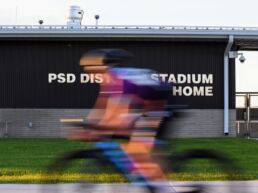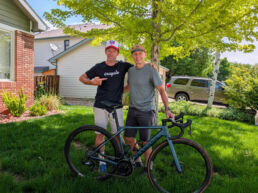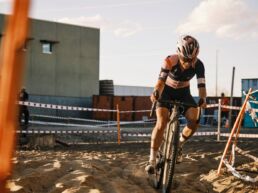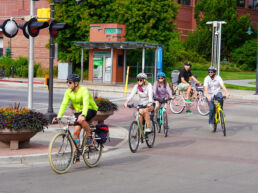The City of Fort Collins’ City Council recently dissolved the Bicycle Advisory Committee (BAC), and created an Active Modes Advisory Board in its place. The last meeting of the Bicycle Advisory Committee happened on Monday, December 11, 2023. As one of their last actions, the BAC invited previous members to the final meeting. After what was probably the shortest meeting on record was adjourned, the attendees turned to celebration and reminiscing.
One of the people instrumental in the formation of the BAC, Dave “DK” Kemp, had the following thoughts to share.
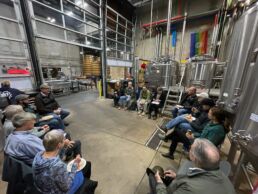
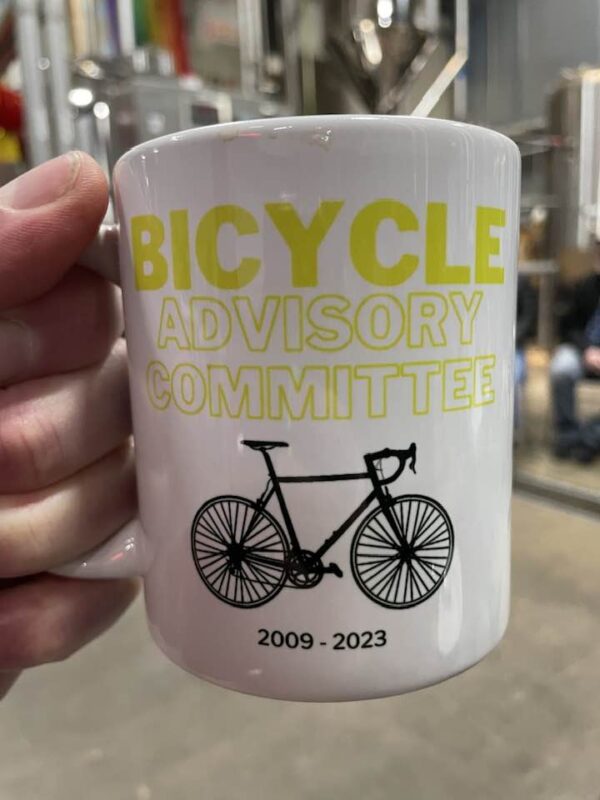 Fort Collins has always had a knack for supporting and promoting cycling. A rich history of advocacy and planning goes back five decades, but that’s a longer story for another time. I have the honor to reflect on the last 20 years and share the genesis of the Bicycle Advisory Committee (BAC), its purpose, and the impact it’s had on Fort Collins.
Fort Collins has always had a knack for supporting and promoting cycling. A rich history of advocacy and planning goes back five decades, but that’s a longer story for another time. I have the honor to reflect on the last 20 years and share the genesis of the Bicycle Advisory Committee (BAC), its purpose, and the impact it’s had on Fort Collins.
In 2003, the City of Fort Collins was designated a “silver” level Bicycle Friendly Community by the League of American Bicyclists. The Bicycle Friendly Community designation was a new national program that evaluated and rated a community’s accomplishments and commitment to creating an environment conducive, if not exceptional, for bicycling. The more programs, projects, policy, and events a community had in place, the higher the ranking. A designation meant national recognition and numerous communities throughout the U.S. aspired to be on the esteemed list.
In 2007, the city reapplied and received yet another silver-level designation, but this time, on the “cusp of gold!” A year later, the city reapplied and received the sought after gold-level designation, just as the Fort Collins City Council was about to adopt the 2008 Bicycle Plan. The previous bike plan was adopted in 1995 and a new vision was long overdue. The new plan and the new gold-level designation served as major catalysts to expedite our efforts.
Two key recommendations stemming from the 2008 bike plan were to form a BAC and pursue the platinum-level Bicycle Friendly Community award. The formation of a BAC was also a recommendation by the Bike League as part of their feedback for our new gold-level designation.
“It is recommended that the City explore and pursue the formation of a Bicycle Advisory Committee (BAC) to discuss and plan for the multiple initiatives promoting bicycling in Fort Collins. A potential BAC could initiate and facilitate the exchange of ideas from a variety of community groups, demographics, and City departments, Boards, and City Council.” -2008 Bike Plan (p. 67)
The goals were clear, energy contagious, and it was evident the bike scene was going to quickly evolve. As expected, the community went straight to work and through the formation of the BAC, we brought individuals and representatives from several organizations and various boards and commissions into the bike fold. The objectives were to get everyone talking about bikes and to integrate bicycling into all aspects of city, university, and community affairs. We needed widespread interest and support to go to the next level.
The BAC’s idea exchange, initiative, advisement, and collaboration has resulted in the fruition of numerous bike projects, programs, and pro-bike policy. Much of this success can be attributed to the support and contributions of its members, who both individually and through organizations, worked tirelessly to make a positive impact.
The BAC has helped integrate cycling into areas outside of just transportation and recreation alone. Cycling has become a way of life for many Fort Collins residents- due much in part to the relationship building among BAC members; and the collaborative efforts between the BAC, community organizations, boards and commission, City Council, and staff over the last 14 years.
In 2013, Fort Collins was awarded a platinum-level bicycle friendly community designation and I believe the BAC was instrumental in achieving this milestone. It dawned on me later in my career that while the designation as a platinum-level community was good for momentum and national recognition, the real benefit of working toward this award helped make Fort Collins a better place to live, visit, work, and play.
And the BAC’s role in fostering relationships and bringing transparency to projects, programs, and issues has ensured this outcome. The BAC has done the job it was designed to do.
Looking back, I’ve always been impressed with the BAC’s articulate, insightful, and meaningful communication with policy makers and staff. And most recently, it is my opinion that the BAC has been highly effective in expressing its interests and priorities regarding the need for comprehensive planning and implementation of recreational bicycle facilities. Staff is listening and will carry forward the BAC’s sentiment as we continue our coordination with policy makers in this realm.
And cycling will continue to evolve, as it always has, but this time under the auspices of “active transportation.” Other active modes like walking and rolling need the same spotlight, time, and attention we’ve afforded cycling all these years. Planning for the betterment of bicycling will continue, but in concert and in better alignment with other forms of mobility. Broadening the focus and forming an Active Modes Advisory Board that’s at the same level as other boards and commissions will bring new energy to carry forth the momentum and legacy the BAC created so many years ago.
On behalf of city staff, we are thankful and appreciative of all BAC members who have volunteered their time and expertise. Your commitment, dedication, and passion have advanced cycling in so many ways and I’m certain there are more great things on the horizon.
-D.K.
The formation of the Active Modes Advisory Board was recommended in the Active Modes Plan (AMP) that was approved by City Council in December of 2023, and can be seen as a step forward towards the work outlined in the AMP.
There are some key differences between the BAC and the Active Modes Advisory Board. The BAC was unique in that it had 3 at-large community members and 13 representatives from other boards, commissions, or stakeholder organizations. The Active Modes Advisory Board is a type 1 advisory board, that will consist of 9 members, without additional space carved out for representatives from other organizations or boards to participate. The Active Modes Advisory Board has the option to interact with any organization or other entity as part of their process, so this perspective is not lost.
The new board will hold its first meeting in April of 2024. While this shift in focus from one active method of transportation (bicycles), to all active modes, might seem like it creates less space for the consideration of people riding bicycles, it actually elevates the idea. The Bicycle Advisory Committee was a subcommittee of the Transportation Board. This means that the only way the BAC could advise City Council on things bicycle-related was to act through the Transportation Board. With the formation of the Active Modes Advisory Board, the consideration of bicycles is elevated from sub-committee to board status, with a direct line of communication with City Council. This is not a duplication of the Transportation Board, either. Instead, with a Transportation Board and an Active Modes Advisory Board there are two distinct lenses that City Council could use to examine bicycling in Fort Collins.
The City is accepting applications for the Active Modes Advisory Board until January 15. 2024. Those applying must reside within the City’s Growth Management Area. You can find out more information and apply here: https://www.fcgov.com/cityclerk/boards/
If you have any questions you can reach out to the City’s staff liaison for both the BAC and the Active Modes Advisory Board, Lauren Nagle, at lnagle@fcgov.com, or Davina Lau with the City Clerk’s office at dlau@fcgov.com.
Echoing DK’s thoughts, City staff and Council are thankful for the work the BAC has done over the years, and they have passed a resolution thanking the BAC for its work. You can read a copy of the resolution here.
Thanks to Lauren Nagle, DK, and Kevin Krause for contributing to this article.
If you enjoy this content and appreciate the hustle that goes into YGR please consider supporting the site.

